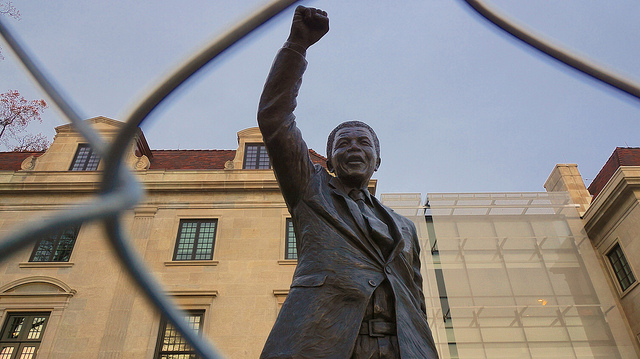Are articles like this important to you? Change the political conversation with a donation today.
What a difference a few decades make.
The world has spent the last week rightly celebrating the life and legacy of Nelson Mandela, a man one letter writer to The New York Times summed up as a “universal champion of freedom, humanity and equality, and as an ardent proponent of tolerance, compassion and forbearance.”
Last week, Nova Scotia’s Human Rights Commission announced it will rename its individual human rights award. The Dr. Burnley Allan (Rocky) Jones Human Rights Award will recognize — rightly again — the late Nova Scotia civil rights leader who devoted his life to “the fight for justice… social justice… equity [for] anyone who experienced any form of discrimination.”
What gets swept to the darkened recesses in these legitimate and long overdue recognitions, however, is an un-whitewash-able reality: neither man shied from an understanding that armed struggle was sometimes a necessary means to their just ends.
Mandela spent 27 years in prison, largely for refusing to renounce violence in the fight to end apartheid. Jones brought members of the militant Black Panthers to Halifax in the late 1960s.
Many of those eulogizing them now tried to undermine them then.
In the case of Mandela, the Canadian government’s Indian Affairs department helped the South African government perfect its apartheid system in the 1940s, while the American CIA showed South African police where to find and arrest Mandela in 1962.
As for Jones, back in the ’60s, Halifax city fathers lobbied the federal government to close Kwacha House, the drop-in centre for inner city youth Jones had helped create. The RCMP targeted him as a dangerous radical and harassed him for decades, ultimately compiling a file that would run to thousands of pages.
I mention this not simply to point out the sanitizing hypocrisy that inevitably accompanies this retrospective mythologizing of our heroes. Mandela and Jones were both special individuals whose humanity and compassion transcended the details of their life stories.
But who are today’s Mandelas and Joneses?
The young people of the Occupy movement?
The prisoners at Guantanamo?
The protesters standing up against fracking in New Brunswick?
Will our grandchildren honour them as heroes 50 years from now?
If so, why are we so quick to vilify them now?
Like this article? Chip in to keep stories like these coming!
This article first appeared in Stephen Kimber’s Halifax Metro column.
Photo: Ted Eytan/flickr



